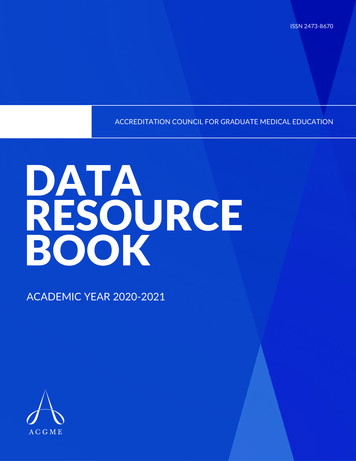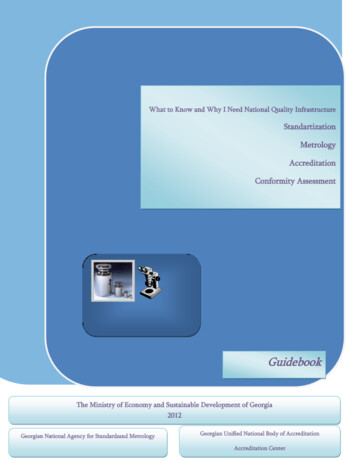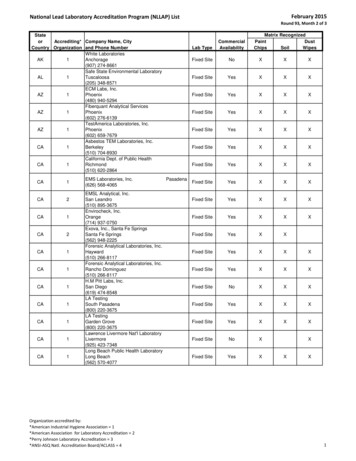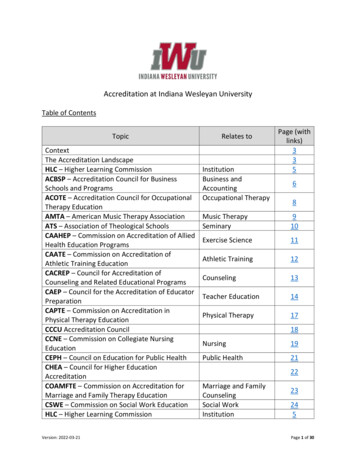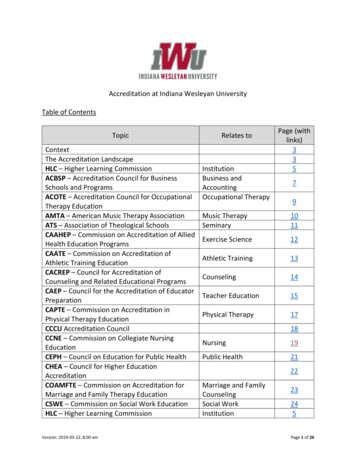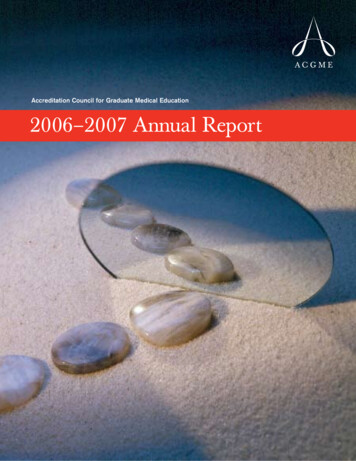
Transcription
Accreditation Council for Graduate Medical Education2006–2007 Annual Report
2 Message from the Chair3 Executive Director’s Report5 Farewell to Dr. Leach6 2006–2007 Statistical Highlights10 2006 Financial ReportYear in Review12 Council of Review Committee Chairs Report13 Council of Review Committee Residents Report14 Institutional Review Committee Report15Learning Portfolio16 2007 Courage to Teach and Courage to Lead Award Recipients21 2007 Annual Educational Conference22Committee Highlights24 Department and Committee Reports26 ACGME Board of Directors28 Review Committees31 2006–2007 Review Committee Members37 ACGME Staff
our missionWe are the ACGMEWe improve health care by assessing andadvancing the quality of resident physicians’education through accreditation.our visionExemplary accreditationour valuesAccountabilityProcesses and results that are:Open and transparentResponsive to the educational community and the health of the publicReliable, valid and consistentExcellenceAccreditation that is:Efficient and iveProfessionalismActions that are:Respectful and collaborativeResponsiveEthicalFair
M e s s age f r o m t h e C h a i r2006–2007 Academic Year a Time of TransitionThis was an eventful year in the history of the ACGME. My term of officebegan in September 2006 after the ending of that Board of Directorsmeeting. I met with Dr. Leach early this spring and he informed me heintended to retire after the September 2007 meeting, so my two-year term beganwith the assumption of the chairmanship of the Search Committee.The February meeting of the ACGME Board was successful in that all businesswas tended to with discussion and dispatch. Highlights included:1. Disposition of appeals.2. Update of our ongoing internal organizational review.3. Bylaws changes.4. The ad hoc Committee on International Accreditation became astanding committee.5. Discussion with the Royal College of Physicians and Surgeons of Canadain which we agreed to hold a conference on international accreditation ofgraduate medical education.6. A discussion about the ongoing actions to establish an Alliance forPhysician Competence.7. Confirmation of new members for the review committees.8. Endorsement of a recommendation from the Finance Committee to seekways to bill for consultations with reference to inquiries for new specialties.9. Exploration of new opportunities for program accreditation.10. Recognition of the awardees for the John Gienapp, the Courage to Teachand the Courage to Lead Awards.I had the pleasure of attending the 2007 ACGME Annual Educational Conferenceand am pleased to report that over 1,000 people registered. The four-day sessionwas a success! Especially impressive was the Marvin R. Dunn Poster Session thatdemonstrated the tremendous work and enthusiasm of those who lead by participatingin graduate medical education. They deserve greater recognition.I would also suggest that all interested parties obtain a copy of a recentACGME publication, if you have not already done so, Journey to Authenticity:Voices of Chief Residents.At the September meeting, the Board appointed Thomas J. Nasca, MD, MACP,to be the next CEO of the ACGME to succeed Dr. Leach. We look forward to hisassuming the leadership and establish the direction for the ACGME with a greatdeal of anticipation and to a long period of service on behalf of our residents andour patients.Any and all question should be directed to me at the ACGME office.William H. Hartmann, MDChair, Accreditation Council for Graduate Medical Education2
E X E C UTIV E D I R E C TO R ’ S R E P O R TGovernance Structure, Portfolios Focus of ACGME’sWork in 2006–2007Having developed a very good strategic plan, the ACGME used 2006–2007to review its governance structure and to answer the question: Does theACGME have the right governance structure to conduct its business effectivelyand to implement its strategic plan and the four strategic priorities? A thorough review ofgovernance was conducted. Input was gathered from stakeholders throughout thegraduate medical education community. In November 2006, 534 members of theACGME community participated in an online survey; 77 also had supplementalin-depth interviews by telephone. In March 2007 a separate online survey of the Boardof Directors was conducted to solicit their input into needed changes. In June 2007the ACGME Board of Directors, the Council of Review Committee Chairs andrepresentatives of the five founding organizations held an internal review retreatthat processed the results of the surveys and interviews and generated an earlydraft of options and recommendations that will now be considered by the Boardand founding organizations during the 2007–2008 year.Several themes emerged: 1) the need to pay attention to both anatomy (structure)and physiology (relationships) within the ACGME and its review committees andacross the broader community of those interested in GME; 2) a need to be moreinclusive (broadening participation in the Council) and more effective (having asmaller Board of Directors charged with the fiduciary obligations demanded bymodern corporate law); 3) getting independence and interdependence right; 4) morefully expressing a host of operational improvements already underway so thatthe review committees can make more data-driven decisions in ways that relieveburden for programs, reviewers and staff.Does the ACGME have the right governance structureto conduct its business effectively and to implement its strategicplan and the four strategic priorities?Portfolios constituted another major effort this past year. The resident’sday does not begin with goals and objectives; it begins with experience andreflection on experience. One definition of competence is the demonstrated habit ofreflective practice. Needed is an interactive professional development tool that cansupport individual residents as they have a variety of educational experiencesand reflect on them. At its fall retreat the Executive Committee heard a reportfrom the Competency-based Portfolio Advisory Committee. This advisorycommittee reviewed the widespread use of portfolios in both grade school andhigher education. It examined the use of portfolios in other professions and madeseveral recommendations to the Executive Committee and ACGME Board. Thisreport, including an extensive bibliography on portfolios, is available on theACGME website http://www.acgme.org/acWebsite/portfolio/learn cbpac.asp. In3
exec u t i v e d i rec t o r ’ s rep o r t (continued)February the ACGME endorsed going forward with development of a learningportfolio. An alpha prototype has been developed and is being tested. Gradualdeployment of the portfolio over the next few years will enable the largercommunity and the ACGME to learn how to best use this new technology tofoster improvement in resident physician formation.The ACGME has responded to its strategic priority of fostering improvementand innovation in a number of ways. Our improvement work in the past hasbeen limited to the approximately eight percent of programs that are threatenedby some sort of adverse accreditation action. There is abundant evidence thatthose programs improve — but improvement means that they now meet minimalrequirements. What about the other 92 percent? A number of review committeeshave either approved program innovations in which particular requirements arewaived or have offered outstanding programs the opportunity to participatein major improvements with as much as 40 percent of the requirements waivedin exchange for annual outcome data and reporting of community learning.The Committee on Innovation in the Learning Environment is also encouragingprogram, institutional and review committee pilots that will enable designedimprovements to be tested. One initiative — the Learning Innovation andImprovement Project — has identified exemplary institutions and is conductingin-depth interviews and site visits to understand the institutional attributesassociated with sponsorship of outstanding educational programs. These arevery different conversations than usually occur between accreditors and theorganizations they accredit.It has been a deep privilege to be the ACGME’s executive directorfor the past ten years.Lastly, I would like to thank ACGME, its employees and volunteers, as wellas the larger community of those who take graduate medical education seriously.It has been a deep privilege to be ACGME’s executive director for the past tenyears. My decision to retire is the right one, but I leave humbled by the depth andbreadth of our communities. The agenda is compelling and consistently attractstalent and energy. I have had a wonderful time and am grateful to all of you.Thank you.David C. Leach, MDExecutive Director, Accreditation Council for Graduate Medical Education4
f arewe l l t o dr . l eac hDr. Leach Ends Decade of Leadership at the ACGMEwith September RetirementThe ACGME family said farewell in September to David C. Leach, MD,the organization’s executive director and CEO, when he retired after10 years of leading the organization.Dr. Leach, a board-certified internist, joined the ACGME in 1997 after servingfor 28 years as a medical director at Henry Ford Health System in Detroit. He alsowas an assistant dean for the University of Michigan Medical School.During his tenure as executive director, Dr. Leach capably guided the Councilthrough years of change and growth as the ACGME moved to an outcomes-basedemphasis on evaluating programs, adopted common duty hour standards, createda long-term strategic plan, moved to computerized data collection, and developedan online learning portfolio system for residents.“David’s quiet and effective leadership has moved the ACGME in new andimportant directions for the benefit of residents and the public. He will be missed,”said William H. Hartmann, MD, chair of the ACGME Board of Directors.What I Have Learned So FarMeditation is old and honorable, so why should Inot sit, every morning of my life, on the hillside,looking into the shining world? Because, properlyattended to, delight, as well as havoc, is suggestion.Can one be passionate about the just, theideal, the sublime, and the holy, and yet committo no labor in its cause? I don’t think so.All summations have a beginning, all effect has astory, all kindness begins with the sown seed.Thought buds toward radiance. The gospel oflight is the crossroads of — indolence, or action.Be ignited, or be gone.by Mary OliverCEO David C. Leach, MD, accepts a retirementgift from the ACGME community presented byACGME chair William H. Hartmann, MD.R E FL E C TIONS“In truth, you have spent your life makingcountless people look better than theyare or, more precisely, better than theyknew they were. This gift has been atthe heart of your exceptional leadershipas a physician and as an administrator.”Parker J. Palmer, PhD, author ofThe Courage to TeachHis devotion is always to teachHis advice we so often beseechThis man we admireAnd now he’ll retireCongrats to our David C. Leach!Nancy Spector, Director of Education,National Council of State Boards of Nursing“You have managed the Council, itscommittees, and the ExecutiveCommittee masterfully by makingsuggestions rather than requests ordemands, and by inviting their bestthinking to the issues at hand.”David L. Nahrwold, MD, Chairman of the Board ofCommissioners, Joint Commission“David, you have put your mark on medicaleducation — vividly on graduate medicaleducation that mark is a positive,innovative, and aspirational one. It will,as they say, have legs.”Bruce E. Spivey, MD, Deputy Executive VicePresident, Council of Medical Specialty SocietiesReprinted with permission from “New and Selected Poems, Vol. Two,” by Mary Oliver, Beacon Press, Boston.5
2 0 0 6 – 2 0 0 7 s t a t i s t i ca l h i g h l i g h t sThe statistics on these pages illustrate the work of the dedicated members ofthe ACGME — community‑field surveyors, review committee members,Board members and ACGME staff — who are carrying out the ACGME’smission to improve the quality of health care by assessing and advancing the qualityof resident physicians’ education. The figures, charts and graphs show the ACGME’sactivities by the numbers from July 1, 2006 to June 30, 2007.Programs8,355 ACGME-accreditedresidency programs4,008 core programs298 programs were newlyaccredited — 115 core programsand 183 subspecialty programs13.4% of programs had new programdirectors — 15% of core programsand 11.8% of subspecialty programs4,347 subspecialty programs8,355 ACGME-accredited residency programs106,383 residents enrolled inACGME-accredited programs89,607 (84%) in core programs16,776 (16%) in subspecialtyprograms5,320 programs appeared inreview committee agendas duringthe academic year2,057 programs reviewedreceived accreditation orcontinued accreditation97 programs reviewed receivedinitial accreditation3 programs received accreditationwith warning298 newly accredited programs6
Site Visits697 sponsoring institutionsField staff conducted 1,959 sitevisits including:68 institutional site visits1,005 site visits of core programs829 site visits of subspecialtyprograms32 programs receivedprobationary accreditationor continued probationaryaccreditation59 programs voluntarily withdrewtheir accreditation12 programs had theiraccreditation withdrawnOne new subspecialty, medicalbiochemical genetics, was approvedThe ACGME heard three appeals.One decision was sustained and twowere rescinded.Review committees proposed firsttime adverse actions for 7.7% ofprograms reviewed24.5% of proposed adverse actionswere sustained71.9% of proposed adverse actionswere rescinded57 site visits conducted by specialistsite visitorsSponsoring Institutions697 sponsoring institutions319 institutions sponsor one program378 sponsor multiple programs2,858 institutions participate inresident education (residents spendat least one month in rotation)5,320 programs appeared on RRC agendas7
2 0 0 6 – 2 0 0 7 s t a t i s t i ca l h i g h l i g h t s (continued)Resident Physicians by Type of Medical School (2006–2007)Core Specialty ResidentsMedical School Unknown21610,332US LCME-Accredited Medical SchoolOsteopathic Medical School85559,9495,9685,486International Medical SchoolCanadian Medical SchoolSubspecialty Residents23,420111254Status of Resident Physicians in Accredited Graduate Medical EducationConfirmed Status of ResidentsDuring 2006–2007Full-timePart-timeTotalCore Specialty Programs89,41918889,60784.23%Subspecialty Programs16,7067016,77615.77%Core Specialty ResidentsLeave of AbsenceIn Program but Doing Research/Other Training218731,0213223,814Completed Preliminary TrainingCompleted All Accredited Training (for this specialty)Transferred to Another ProgramWithdrew from ProgramSubspecialty eased243For the statuses “Completed Preliminary Training”, “Completed All Accredited Training”, “Transferred”,“Withdrew”, “Dismissed”, and “Deceased”, the resident left or completed the program betweenSeptember 1, 2005 and August 31, 2006. All other statuses reflect the academic year (July 1, 2006through June 30, 2007).8
Accredited Core Specialty Programs and Resident Physicians on Duty (2005–2006)% of ResidentsAllergy and Immunology0.3%1.8%Anesthesiology5.7%3.3%Colon and Rectal Surgery0.1%1.1%Dermatology1.2%2.8%Emergency Medicine3.5%4.9%10.8%11.6%Family PracticeInternal Medicine9.6%Neurological Surgery0.1%1.2%0.9%2.4%1.8%3.0%NeurologyNuclear Medicine0.2%1.5%5.3%6.2%Obstetrics and GynecologyOphthalmology1.5%2.9%3.6%3.8%Orthopaedic SurgeryOtolaryngology1.5%2.6%2.6%3.7%Pathology — Anatomic and ClinicalPediatricsPhysical Medicine and RehabilitationPlastic SurgeryPreventive 9%4.7%Radiology — DiagnosticSurgery — GeneralThoracic SurgeryUrologyTransitional Year9.0%5.0%PsychiatryRadiation Oncology24.8%1.5%2.0%Internal Medicine /PediatricsMedical Genetics% of Programs6.3%0.3%8.2%2.1%1.1%1.4%3.0%3.2%For more information and to view graduate medical education reports and data, please visit www.acgme.org/adspublic9
2 0 0 6 f i n a n c i a l rep o r tThe ACGME’s fiscal year runs from January 1 to December 31. The 2006revenue came primarily from annual fees charged to all program accreditedduring the academic year 2005-06. Programs with five or more residentsare charged 3,500 annually, and programs with fewer than five residents are charged 2,750. Fees for 2006 remained unchanged from those of 2005. The ACGMEcommits to keeping these fees stable for a minimum of three years. ACGME reserves,defined as cash and investments, totaled 25.6 million, equivalent to ten months ofoperating expenses, at year’s end.RevenuesInvestment Revenue 1,268,1584.51%Workshops and Miscellaneous Income637,8202.27%Application Fees988,0603.52%Grants (not visible in chart)18,8500.07%Appeals Fees (not visible in chart)11,7360.05%Annual Program Accreditation Fees 24,945,19088.80%Rent Revenue221,9710.79%Total 28,091,785100.00%Administration and Research 6,614,29425.14%Rent & Contracted Support Services 2,200,7608.37%RRC Activities 7,659,04629.11%Field Staff Activities 6,484,21124.65%Appeals & Legal Services 558,9192.12%ACGME Activities 2,789,87810.61%ExpensesTotal10Financial data audited by the independent auditing firm Miller, Cooper & Co., Ltd., Northbrook, Illinois. 26,307,108 100.00%
Year in Review
c o u n c i l o f re v i ew c o mm i t t ee C H A I R SCRCC Addresses Common Program Requirements,Strategic PrioritiesThe Council of Review Committee Chairs (CRCC) advises the ACGMEBoard of Directors on matters related to accreditation and the work ofthe review committees (RCs). Council members include the chairs ofthe 27 specialty review committees, the Institutional Review Committee (IRC), andthe Transitional Year RC; a member representing the Organization of ProgramDirector Associations; and a representative of the Royal College of Physicians andSurgeons of Canada. The director of medical and dental education from the Officeof Academic Affiliations of the Veterans Administration also sits on the Council asan official observer.The CRCC is actively engaged with the ACGME Board of Directors throughrepresentation on various Board committees. The chair acts as an official observeron the ACGME Executive Committee and as a voting member of the ACGMEBoard of Directors and the Committee on Strategic Initiatives. The vice chair ofthe Council sits as an official observer on the Committee on Requirements andas a member of the Awards Committee. The CRCC also appoints an observer tothe ACGME Monitoring Committee.The CRCC engaged in several key activities during 2006–2007: Led by Margaret M. Grimes, MD, Chair of the RC for Pathology, theCRCC completed its extensive work on revising the Common ProgramRequirements (CPRs), approved by the ACGME in February 2007 andeffective on July 1, 2007. Dr. Grimes chaired the Committee to Reconcilethe Common Program Requirements which included representativesfrom the CRCC and the IRC. The CRCC contributed to conceptualizing the potential RC reportingfunction for the initial stages of the ACGME portfolio project. The first orientation session for new chairs was held in conjunctionwith the ACGME’s February 2007 Board meeting. The CRCC Chairand ACGME staff provided useful information regarding the chairs’responsibilities outlined in the ACGME’s Bylaws, Policies, and Procedures. In June 2007, CRCC members participated with the Board of Directors ina day-long retreat to develop recommendations for changes/improvementsto better align the ACGME governance structure with its strategic priorities.Discussions focused on the results of the ACGME Internal Review Surveyin which the chairs also participated. The CRCC listserv was initiated as a tool to facilitate communicationamong the members.Each chair member of the CRCC engages in regular review committee review workin addition to participation in this leadership organization within the ACGME.Members’ collective efforts are a vital manifestation of ACGME’s commitment toits vision for exemplary accreditation.12Written by Louis B. Cantor, MD, Chair, Council of Review Committee ChairsChair, Review Committee for Ophthalmology
c o u n c i l o f re v i ew c o mm i t t ee R E SI D E NTSResidents’ Council Discusses Learning Portfolio,Faculty EvaluationThe Council of Review Committee Residents is comprised of all of theresident appointees to the 26 review committees representing their respectivespecialties, the resident member of the IRC and the AMA’s residentappointee to the ACGME Board. It is served by a chair and vice chair, each electedfrom among the Council’s resident members. The chair of this Council serves onthe Board of Directors of the ACGME, and the vice chair and chair also serve ontwo key ACGME committees, the Committee on Program Requirements and theCommittee on Innovation in the Learning Environment.In 2007, the Council had an active year. The Council meets biannually inFebruary and September in Chicago to coincide with Board meetings. The prioritiesof the Council are: Provide direct and broad input to the ACGME staff and leadershipregarding policy; Increase communication between residents and the ACGME; Provide a resident perspective on accreditation, resident education andpolicy or innovation endeavors.The Council also has as a priority to be actively involved in the formulation andimplementation of the learning portfolio as it relates to graduate medical educationand accreditation of residency training programs.The Council also had a leadership change in 2007 with Drs. Seenu Reddyand Cynthia Bodkin completing their terms as chair and vice chair and Dr. KarenHsu Blatman being elected as the new chair for a two year-term.The Council had an engaging and informative meeting in September 2007. Issues regarding the ACGME’s role as a resource and source ofeducational innovation were discussed; Residents on the Council were updated regarding the learning portfolio; The Council also opened a dialogue with the Federation of StateMedical Boards with regard to its Credential Verification Servicesand the information it collects with regard to resident educationand events during the residency years; The Council also sent communication to the Committee on ProgramRequirements encouraging the recognition of alternate forms of scholarshipor teaching when evaluating faculty members in program reviews.Written by V. Seenu Reddy, MD, MBA, 2005–2007 chair of the Council of ReviewCommittee Residents13
INSTITUTION A L R E VI E W C O M M ITT E EIRC Revises Requirements, Tackles 116 Agenda ItemsIn addition to its regular accreditation review work, the Institutional ReviewCommittee focused a great deal of its attention on revising the InstitutionalRequirements. As part of that process, two IRC members collaborated withmembers of the Council of Review Committee Chairs on the Committee to Reconcilethe Common Program Requirements. This reconciliation effort to assure consistencyand to eliminate unnecessary redundancy between the Institutional Requirementsand Common Program Requirements was the first ever by the ACGME andrepresents a response to the ACGME’s Strategic Plan. The wider graduate medicaleducation (GME) community demonstrated a great deal of interest in the proposedrevision; at its annual advancement meeting the IRC reviewed and responded to31 pages of comments from the field.The revised Institutional Requirements were approved by the ACGMECommittee on Requirements in February 2007 and became effective on July 1, 2007.The final document was approximately 700 words shorter than the previous versionand was significantly reorganized for easier reference. The IRC also revised theInstitutional Review Document (IRD) into a shorter, more user-friendly documentwhich has been met with positive reaction by designated institutional officials(DIOs) and GME coordinators.The final document was approximately 700 words shorterthan the previous version and was significantly reorganizedfor easier reference.As part of the ACGME’s Annual Education Conference, members of theIRC staged a mock review meeting based on actual de-identified cases. Participantcomments in follow up evaluation strongly supported the transparency of the processwhich led to much greater understanding of the IRC’s expectations.The IRC’s new leadership includes chair Linda Famiglio, MD, associatechief medical officer and DIO at Geisinger Health System; and vice chair,Andrew M. Thomas, MD, assistant dean for GME at Ohio State University.During 2006–2007, the Institutional Review Committee (IRC) processed atotal of 116 agenda items. These items included: 79 continued accreditation actions 4 initial accreditation actions 5 proposed probationary actions 1 probationary action 29 progress reports No deferred actions14Written by Patricia M. Surdyk, PhD, executive director, Institutional Review Committee
l ear n i n g p o r t f o l i oACGME Begins Alpha Testing of Learning PortfolioThe ACGME Learning Portfolio (ALP) initiative has gained excitingmomentum during the 2006–2007 academic year, after receivingadditional authorization and endorsement from the ACGME Boardof Directors in February 2007 to move forward with development.Key accomplishments and activities in academic year 2006–2007 includedthe following: Competency-Based Portfolio Advisory Committee: In spring 2006 — tobroaden input and insights into the development of an electronic webbased portfolio to support resident learning, evaluation, and professionaldevelopment — Dr. David Leach convened an ad-hoc committee composedof representatives from residency programs, specialty boards, reviewcommittees, and ACGME staff to advise the ACGME. The committeemet three times and prepared a report, the recommendations of whichwere approved by the Board in February 2007. A copy of the report isposted on the website, www.acgme.org. Prototype Development: The ALP Development Team (composed ofACGME senior leadership, portfolio innovators from two academic medicalcenters, project management staff, and a web applications developer) isleading the design and development of the portfolio prototype. Theportfolio is learner-centered and contains pre-loaded evaluation tools thatare competency-based (with the capacity to easily create tools from a poolof evaluation items). Testing of the alpha-prototype version began inAugust 2007. Alpha Testing: The alpha-test phase is being conducted with a very smallsubset of programs (8–10) to test and garner feedback on the overallfunctionality and usability of the alpha-prototype system from bothtechnical and educational use perspectives. Alpha testing began in August2007 and will continue through June 2008. Developmental Evaluation: In June 2007, Michael Quinn Patton, PhD, anexpert in program evaluation led a workshop on developmental evaluationfor those identified as early users of ALP. Dr. Patton will assist with theevaluation planning for the alpha-test phase and the formative evaluationreport to be presented to the ACGME Board in February 2008.TI M E LIN E — A L P A P P R OV A L P R O C E SSSeptember 2005ACGME Board Executive Committeeauthorizes initial exploration anddevelopment of a portfolioFebruary 2006ACGME Committee on StrategicInitiatives and the Councilof Review Committee Chairsendorse authorizationNovember 2006ACGME Board Executive Committeeapproves Competency-Based PortfolioAdvisory Committee (CBPAC) reportwith minor modificationsFebruary 2007ACGME Board of Directors acceptsfinal recommendations of the CBPACIn addition to the work above, we have also begun to acquire a list of programsinterested in being involved as beta-test sites for the portfolio. We are seeking across-section of programs to work together by specialty to assess the stability andusability of the beta-prototype portfolio, and to develop and test portfolio componentsto meet unique specialty needs. Beta testing is anticipated to begin in mid-July 2008.Written by Lisa C. Johnson, MBA, Manager, ACGME Learning Portfolio15
2 0 0 7 award rec i p i e n t sFront row (left to right): Allen Silbergleit, MD; Paul B. Batalden, MD; Robert Cefalo, MD; David C. Leach, MD; John Weinerth, MD; David B. Allen, MD;Neil C. Mitnick, DO; Humberto Quintana, MD. Back row (left to right): Hasan Bazari, MD; Robert C. Heros, MD; Gary S. Clark, MD; Jeffrey G. Wiese, MD;Javier Gonzalez del Rey, MD. Not pictured: Carey Chisholm, MD; Debra Weinstein, MD.Ten residency program directors and three designated institutional officialswere honored with the ACGME’s 2007 Parker J. Palmer Courage to TeachAward and Courage to Lead awards.The Courage to Teach Award is named after Parker J. Palmer, PhD, asociologist and educator who wrote The Courage to Teach, a book of reflections onthe intellectual, emotional and spiritual aspects of teaching. Each year the ACGMEchooses the Courage to Teach recipients from among numerous nominees submittedto the Council. The award honors program directors for their exemplary teachingof residents and leadership of innovative and effective residency programs.“It takes real courage to teach in today’s frenzy-laden world,” noted Dr. Leach.“Teaching creates a space in which obedience to truth is practiced; properly done,it affords an opportunity for deep reflection. These program directors havedemonstrated skills not only of the heads and hands, but of the heart. Theyhave modeled what it looks like when the whole doctor shows up.”The three designated institution officials who received the Courage to LeadAward were honored for their outstanding leadership; dedication to promotingthe professional, ethical, and personal development of residents; and commitmentto safe and appropriate care of patients.The Courage to Teach and Courage to Lead award winners were honored ata dinner during the ACGME’s
Chair, Accreditation Council for Graduate Medical Education 2 MEssAGE fRoM thE ChAiR. 3 Governance Structure, Portfolios Focus of ACGME's Work in 2006-2007 H . newly accredited programs 8,355 ACGME-accredited residency programs 4,008 core programs 4,347 subspecialty programs

